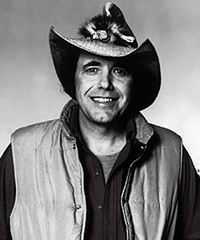b. Robert Joseph Bare, 7 April 1935, Ironton, Ohio, USA. Bare was raised on a farm; his mother died when he was five, and his sister was adopted. As an adolescent, he dreamed of being Hank Williams: "then Hank died and I didn't want to be like him no more". Nevertheless, he started songwriting and secured an early morning radio spot, and later worked on television in Charleston, West Virginia. He moved to California and impressed Capitol Records, recording for them in 1955. After receiving his draft notice in 1958, he wrote a parody of Elvis Presley going into the army, "All American Boy". Returning to Ohio to join the army, he met his friend Bill Parsons and joined his recording session. He contributed "All American Boy' with the intention that Parsons would learn it later. Parsons" name was put on the tape-box because Bare was still under contract to Capitol. The label's owner liked "All American Boy' and released it under Parsons" name. The single climbed to number 2 on the US charts and made number 22 in the UK. The song resembles Shel Silverstein's, which was later recorded by Bare, but most of Bare's early songs were straight country, being recorded by such contemporary stars as Wynn Stewart and Ferlin Husky.
Bare resumed his own career on leaving the army, but his singles ("Lynchin' Party", "Sailor Man", "Lorena") made little impact.
He wrote twist songs for Chubby Checker's movie Teenage Millionaire, but Nashville songwriter Harlan Howard persuaded Chet Atkins to record him for RCA-Victor Records. A ballad, "Shame On Me", made number 23 on the US pop charts and crossed over to the country market. Bare was travelling to Nashville to record the follow-up when he heard Billy Grammar's "I Wanna Go Home" on the radio. He admired the story of the country boy going to the city ("By day I make the cars/By night I make the bars") so much that he recorded the song as "Detroit City". Bare's record made number 16 on the US charts and won a Grammy. He had his biggest US hit (number 10) with "500 Miles Away From Home". His fourth pop hit (number 33) came with "Miller's Cave". Bare appeared in the 1964 movie A Distant Trumpet, but he disliked being stuck in the Arizona desert and was determined to move to Nashville, join the Grand Ole Opry and become a full-time country singer. He recorded prolifically, including an album of standards with Skeeter Davis that featured a successful single, "A Dear John Letter". In 1966, Bare returned to his favourite theme (a country boy uneasy in the city) with the Tompall Glaser and Harlan Howard song "Streets Of Baltimore", which was arranged by Ray Stevens. It was followed by Tom T. Hall's "Margie's At The Lincoln Park Inn". "It's a great cheating song," says Bare, "because you don't know if the guy is going to go back or not." By this time, Bare was recording consistently strong material, including an album about nostalgia, A Bird Named Yesterday, mostly written by Jack Clement.
In 1970, Bare moved to Mercury Records and found success with two early Kris Kristofferson compositions, "Come Sundown" and "Please Don't Tell Me How The Story Ends". Producer Jerry Kennedy's pared-down arrangements were ideal for his half-singing, half-talking style. Chet Atkins invited him back to RCA, where he signed on condition that he could produce his own records. He subsequently recruited songwriter Shel Silverstein to compose an album. The concept was simply one of stories, but Lullabys, Legends And Lies, released as a double album in the USA and a single album in the UK with no loss in music, has become a classic country album. It included the Cajun "Marie Laveau", based on fact, which is his only US country number 1 and a concert favourite where Bare, arm outstretched, fist clenched, punches out the words. He had a US country hit with another track, "Daddy What If", featuring his five-year-old son, Bobby Bare Jnr. "The Winner", a witty song about the price of winning, had another 20 verses, which Bare omitted but which were subsequently published in Playboy. Another Silverstein-Bare collaboration, Hard Time Hungrys, dealt with social issues and included a sombre song about unemployment, "Daddy's Been Around The House Too Long'. The success of his good-natured, family album Singin" In The Kitchen, was marred by the death of his daughter, Cari, in 1976. Bare, never one to stand still, took chances by recording such strange, controversial material as "Dropkick Me Jesus (Through The Goalposts Of Life)" and the expletive-driven "Redneck Hippie Romance". He returned to the mainstream with the superb Bare in 1978, which included laid-back ballads ("Too Many Nights Alone", "Childhood Hero") and the hilarious "Greasy Grit Gravy" with Waylon Jennings, Willie Nelson and Dr. Hook. His album, Sleeper Wherever I Fall, cost $100,000 to make, but Bare was lost in the varied arrangements and reverted to albums with small studio audiences. In 1979, Bare helped to establish Rosanne Cash's career by singing with her on "No Memories Hangin' Round". Bare's singles for Columbia Records included "The Jogger", "Tequila Sheila", "Gotta Get Rid Of This Band", "When Hippies Get Older" and "Numbers", inspired by the Dudley Moore movie 10.
Although his record sales dropped off during this decade, Bare retained a loyal following and the respect of a new generation of country artists. He has become more laconic and droopy-eyed with age but continues to entertain audiences around the world. "I like everything I record. I'm afraid that if I recorded something that I didn't like, it might be a big hit and I'd be stuck with it every night for the rest of my life. That's a real nightmare."
Source: http://www.oldies.com
